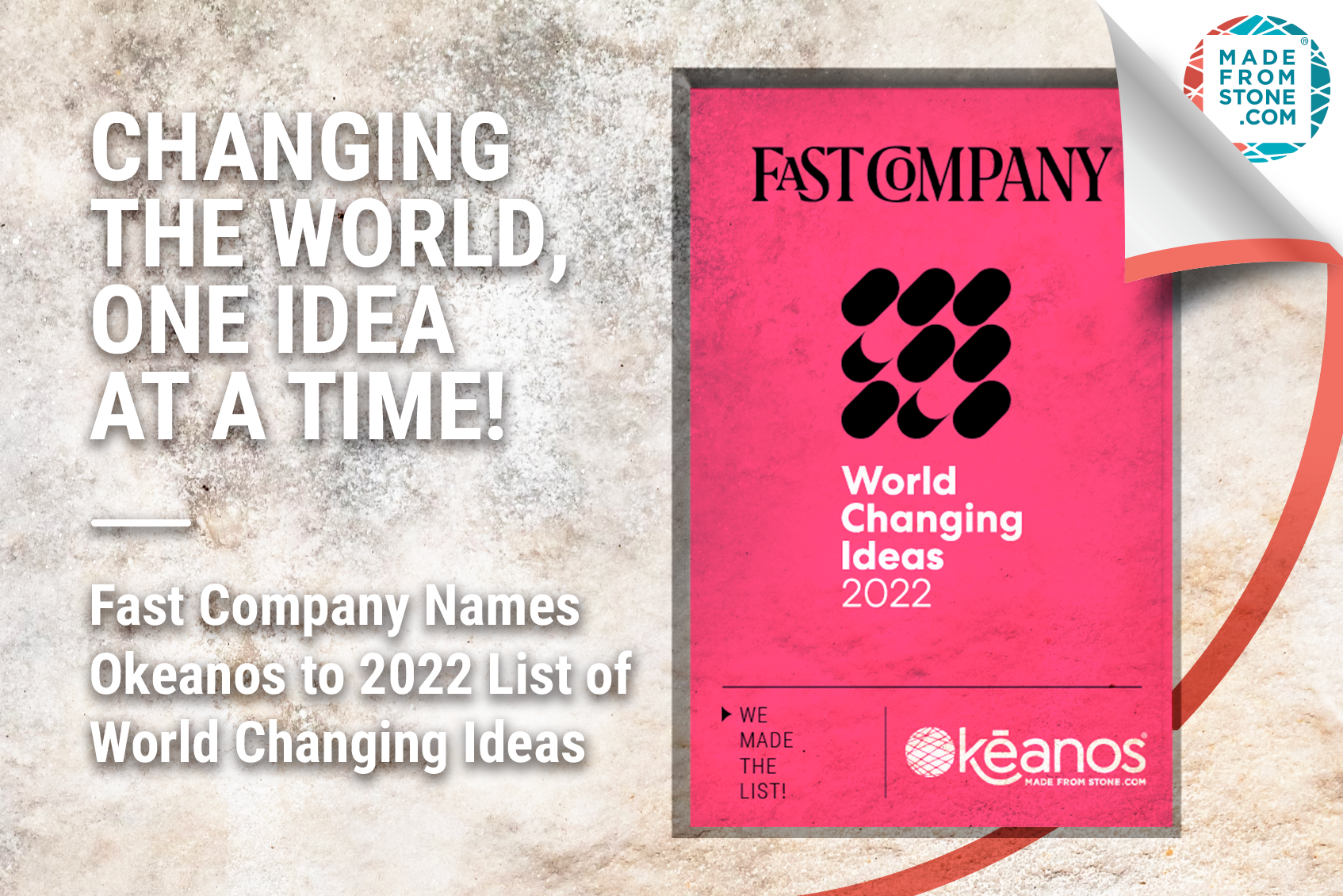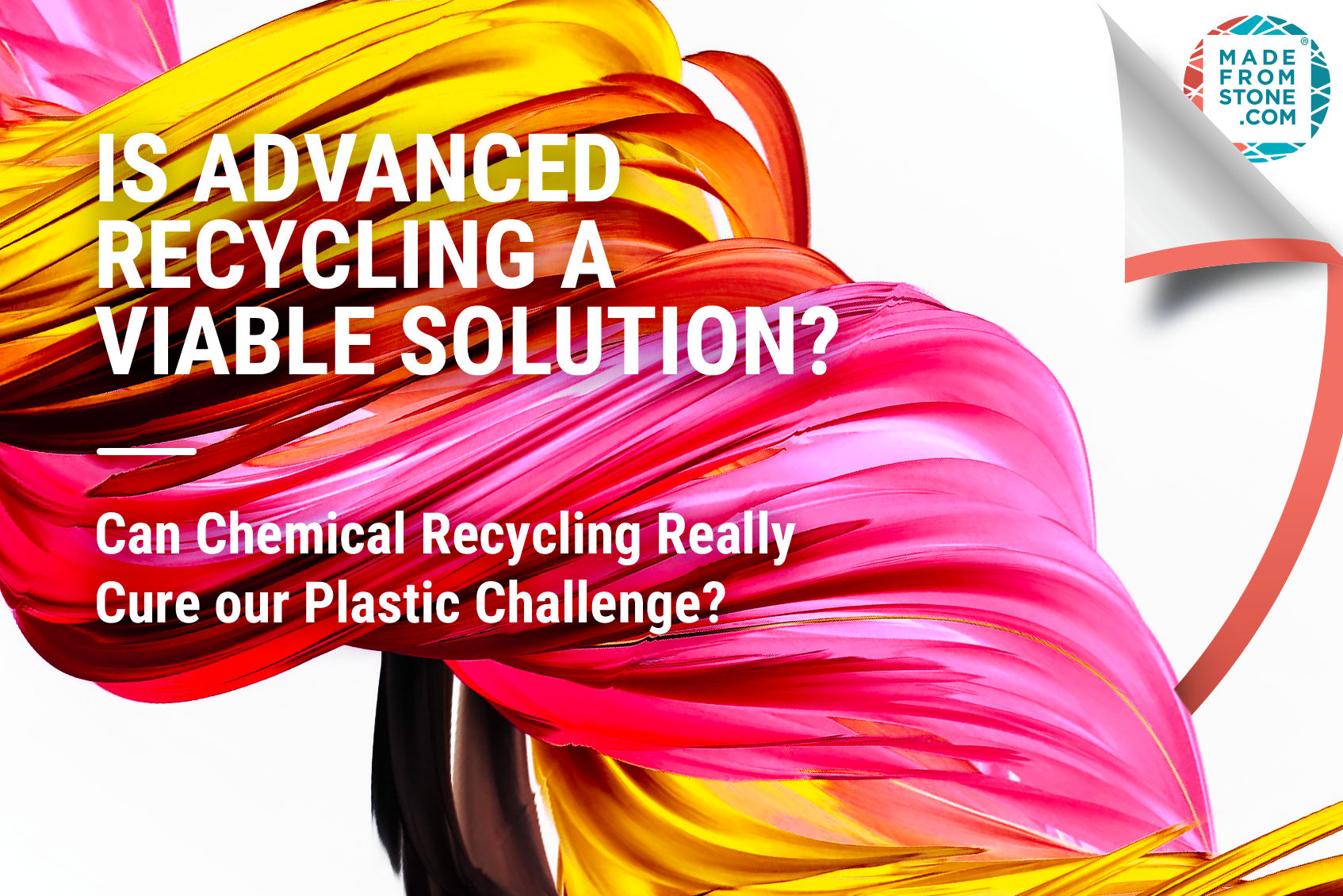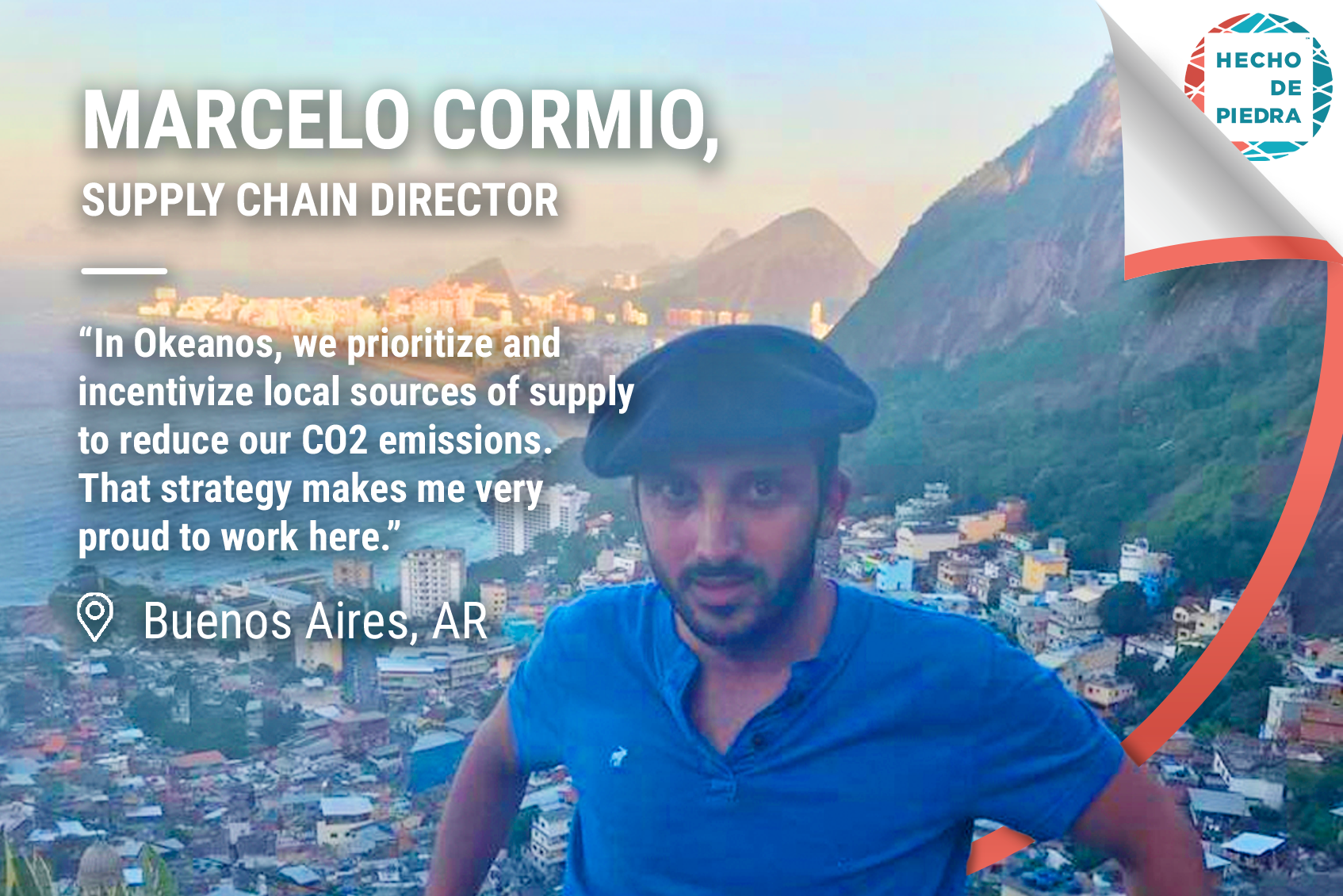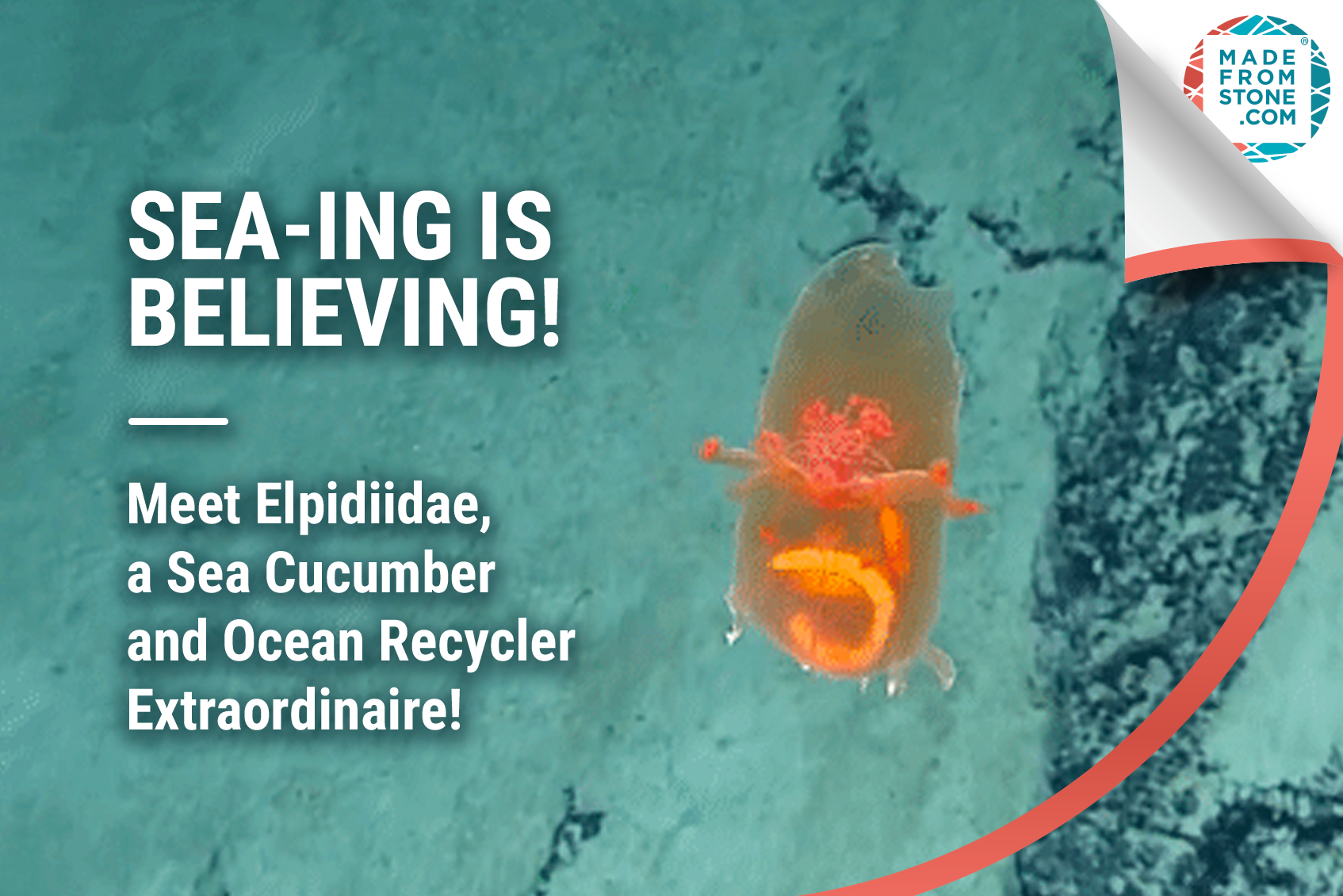Okeanos was named one of Fast Company’s 2022 World Changing Ideas!
+
|
|
||
|

We’re thrilled to announce that Okeanos has been named a finalist on the list of 2022 World Changing Ideas!
Fast Company’s World Changing Ideas awards honor products, concepts, companies, policies, and designs that are pursuing innovation for the good of society and the planet. Chosen from over 3,000 applicants, Okeanos joins the likes of Impossible Foods, Ford, and Air Company on this prestigious list!
Our World Changing Idea works better if we work together.
To learn more about our technology, please email trade@madefromstone.com

On Sunday, May 15th Okeanos, represented by our Government Affairs Officer Martina Hauser, signed an MoU with our partner Amr Sheta of Income International, and Dr. Yasmine Fouad, Egyptian Minister of the Environment, in the presence of Prime Minister Dr. Mostafa Madbouly.
This MoU outlines the government’s support for reducing plastic content and carbon emissions in packaging and single-use items by more than half, using calcium carbonate!
“The project in Egypt represents an opportunity for the country to lead the way in adopting real sustainable solutions to plastic pollution,” explained Dr. Yasmine Fouad.
Okeanos Egypt plans to invest in a plant to make its patented product for local manufacturers tapping into a vast deposit of previously underutilized calcium carbonate, replacing nearly $3 billion in feedstock imports. Here, locally sourced Egyptian calcium carbonate will be processed with Egyptian labor to produce technical compounds that can be utilized by leading Egyptian brands.
“The Okeanos Egypt project is proof that the Made From Stone solution is scalable, affordable, and immediate, establishing the project as a beacon of public/private cooperation in the region and an example that can be reproduced today, and not in years or decades, by governments and leading brands around the world,” explains Florencio Cuétara, Okeanos CEO.
Are you a local government looking to bring a sustainable solution to plastic pollution to your community? Get in touch at partnerships@madefromstone.com

You may have heard about the recycling industry’s new “buzzword” – Advanced recycling, which is a term used to define a process by which chemicals break down plastic into raw materials. These raw materials are used to make new plastic items or can be converted into fuels like gasoline.
But does this new “advanced” solution really advance our progress toward reducing plastic?
Touted by oil, gas and chemical companies as the next generation of recycling, advanced recycling was introduced to the market in 2018 with high hopes.
However, the technology’s detractors claim that advanced recycling defeats the purpose of recycling in the first place, due to the energy-intensive processes required to make it work, and the air pollution that results from the use of the chemicals. In fact, a study commissioned by plastic manufacturers themselves found that advanced recycling generated more greenhouse gases than either landfilling plastic or burning it!
Source reduction is one of the foundational principles of Okeanos’ signature Made From Stone technology. We reduce plastic at the point of manufacture. To learn more about our process, visit our YouTube video here

Ice Cream kings, Ben & Jerry’s announced an ambitious plan to reduce GHG emissions by shining the spotlight on an unexpected culprit…cow burps!
According to the company, more than half the company’s carbon footprint can be traced back to their dairy ingredients. Using a seaweed supplement, Ben & Jerry’s believes they will be able to cut methane emissions from burps by more than 80% without changing the taste of the milk!
With this new plan, named Project Mootopia, the celebrated Ice Cream company is targeting cutting emissions on 15 dairy farms to half the industry average by 2024. Project Mootopia will focus on:
If Project Mootopia is successful, it will be introduced across Ben & Jerry’s entire global supply chain.
Okeanos too is working with unconventional solutions to reduce the carbon footprint of our products. To learn more about how we keep track of your packaging’s carbon footprint, visit our LCA page here!

Meet Marcelo, our Supply Chain Director! Marcelo ensures Made From Stone compound and additives get where they need to be, coordinating shipments, and ensuring our sustainability commitments extend to our supply chain. Read on to learn more about him!
Tell us about your childhood. Did you spend time by the ocean?
I was raised in a small city 500 km north from Buenos Aires. During summers, we spent our vacations in the south of Brazil as it was closer than the Argentinean Sea coast (also beaches and weather were much better). I remember playing football by the sea until the sun went down.
How has working for an environmentally focused company impacted the choices you make in your daily life?
It made me more aware of the damage we are doing with our daily choices. That awareness made me change some habits including taking my own bag to the supermarket, sorting the waste we generate at home, buying fewer plastic toys for my kids, and in general, try not to buy things I do not really need.
How has the conversation of sustainability transcended the field of logistics and supply chain management?
A huge portion of pollution and CO2 emissions are generated during the supply chain process (trucking and ship traffic, factory emissions, waste disposal, etc.). Despite seeing some initiatives such as electric trucks or better waste treatment, as an industry, we have a long road ahead before we achieve truly sustainable supply chains. In Okeanos, we prioritize and incentivize local sources of supply to reduce our CO2 emissions. That strategy makes me very proud to work here.
If you could pick a body of water anywhere in the world to spend time near, where would it be?
I would like to live in the south of Italy by the Tyrrhenian Sea, because of the sea, the landscape, and the food.
What new skill or hobby did you pick up during quarantine?
I dedicated a lot of time improving my cooking skills but what I liked the most from the quarantine is the time I got to spend with my family..
Now that the world is beginning to re-open, what is the thing you’re most looking forward to?
I’m looking forward to traveling again. Experiencing new places, different people, and flavors. Nevertheless, one good thing about quarantine is that I got to travel around my country (Argentina) and discovered beautiful places I didn’t know that existed.
Want to be part of the Okeanos team?
Check out our Careers page!

In this section of Set In Stone, we like to highlight the surprising, unique, and unusual phenomena and creatures that make our Okeanos worth preserving. Meet Elpidiidae!
You wouldn’t be faulted for thinking this cool cucumber spotted in the pacific ocean was just another piece of marine debris, perhaps a floating plastic bag filled with Cheetos? That’s what scientists first thought when they discovered Elpidiidae, a never-before-seen species of sea cucumber with a translucent skin and glowing orange insides!
Deep-sea cucumbers aren’t just cool to look at, they are stewards of their ocean environment too! Feeding on marine snow, skin cells, and dead animals, that filter down to the ocean floor, this creepy creature is able to store carbon from the organic material it eats. In fact, the ocean floor is the largest carbon sequestration system on earth!
Want to see more stunning sea-creatures?
Click here to head over to our Instagram.
News You Should Know:
| Cookie | Duration | Description |
|---|---|---|
| cookielawinfo-checkbox-analytics | 11 months | This cookie is set by GDPR Cookie Consent plugin. The cookie is used to store the user consent for the cookies in the category "Analytics". |
| cookielawinfo-checkbox-functional | 11 months | The cookie is set by GDPR cookie consent to record the user consent for the cookies in the category "Functional". |
| cookielawinfo-checkbox-necessary | 11 months | This cookie is set by GDPR Cookie Consent plugin. The cookies is used to store the user consent for the cookies in the category "Necessary". |
| cookielawinfo-checkbox-others | 11 months | This cookie is set by GDPR Cookie Consent plugin. The cookie is used to store the user consent for the cookies in the category "Other. |
| cookielawinfo-checkbox-performance | 11 months | This cookie is set by GDPR Cookie Consent plugin. The cookie is used to store the user consent for the cookies in the category "Performance". |
| viewed_cookie_policy | 11 months | The cookie is set by the GDPR Cookie Consent plugin and is used to store whether or not user has consented to the use of cookies. It does not store any personal data. |
